Practitioners' Voices in Classical Reception Studies
ISSN 1756-5049
You are here
- Home
- Past Issues
- Issue 5 (2014)
- Jeannette Nelson
Jeannette Nelson
Jeannette Nelson is Head of Voice at the National Theatre. She has worked extensively as a voice coach in theatre, film and television. Jeannette worked at the National Theatre from 1992 to 2001, at Shakespeare’s Globe for the 1997, 1998, 1999 and 2001 seasons, with the Royal Shakespeare Company from 2001 to 2005, with Sydney Theatre Company in 2006, and at the National, as Head of Voice, from 2007. Other voice and dialect coaching in London and the UK includes work with the Royal Court, Young Vic, Donmar Warehouse, Shared Experience, Out of Joint, Complicite, Sheffield Theatre, Bristol Old Vic, Birmingham Rep, Nottingham Playhouse, Liverpool Everyman, English Touring Theatre, Oxford Stage Company and the West End. Jeannette was in charge of the company voice work for the recent National Theatre production of Euripides’ Medea. The production starred Helen McCrory in the role of Medea, was directed by Carrie Cracknell, and used a version of the play specially written by Ben Power, Associate Director at the National Theatre.
In this interview with Chrissy Combes at the National Theatre on 14 August, 2014, Jeannette speaks about the role of a voice department in a theatre, and about her work with the actors on the production of Medea.
The production photographs are reproduced with the kind permission of Richard Hubert Smith. All photographs are copyright.
Quotations are taken from Euripides’ Medea in the version by Ben Power.
Links at the bottom of the page lead to audio extracts from the interview.
CC. I’m talking today to Jeannette Nelson, who is Head of Voice at the National Theatre. Jeannette is going to talk to us about the production of Euripides’ Medea which is currently in performance at the National Theatre. This is the first time that a production of Medea has been staged at the National Theatre. The production is directed by Carrie Cracknell and uses a new version of the play, written by Ben Power, who is an Associate Director here. Jeannette, I wonder if I could begin by asking you to tell us a little bit about how you developed your interest in voice?
JN. Well, I was a singer and a dancer. I did that for about ten years and I got a little bored, and I decided when I was 28 to go and do an English degree at university which my school had wanted me to do in the first place (but I went to ballet school instead). My Shakespeare professors at university had been producing student productions of Shakespeare for local schools for many years, to quite a high standard. I played a part in one of their productions, in King Lear. And they asked me whether I would be interested in helping them set up a professional company to pursue these student productions, and I did, and I think then I realised that I was probably going to stay in theatre in some way. And as part of the work I did with the student actors, I did some warm ups around what I knew from singing and so forth. And I began to realise that I was quite interested in that and that people liked what I was doing. And I wondered whether I could continue performing but teach a bit as well. But I wasn’t sure whether anybody trains you to be a voice teacher. And I happened to be driving past the Central School of Speech and Drama one day and I thought I’d stop and see if they had a course. I went in, they gave me the prospectus, and on the very last page there was a small paragraph with details of an Advanced Diploma in Voice Studies. I applied for that, was accepted, and studied on the course. It was probably the best year of my life. It brought together everything I had done before – movement, singing, literature – and I just had a ball, with wonderful people on the course. It was a very small course in those days. It’s now a very big international course. And the external examiner that year happened to be Patsy Rodenberg, who, as you probably know, is my predecessor here at the National Theatre. She gave me a career, really. She invited me to join her at the Guildhall School of Music and Drama as a teacher, part-time. And a couple of years later, she was appointed here at the National Theatre and she asked me to come and to be her assistant. So I spent ten years assisting her here on a part-time basis, and doing lots and lots of other work and freelance. And then I left and went to the Royal Shakespeare Company for four years and then I went to Sydney Theatre Company for a year, and while I was in Sydney, Patsy decided to move on and I applied for the job as Head of Voice. I came back for Christmas, Nick Hytner kindly met me during my Christmas holiday and offered me the job, and I didn’t go back to Sydney. That’s a potted version!
CC. Thank you. And how would you define the role of a vocal coach, or the voice department in a theatre? What do they actually do within the production team?
JN. Ok. That’s a good question. My brief, very clearly, from Nick Hytner, is clarity and audibility. That’s absolutely the base line. It has to be heard clearly in our quite challenging big theatres. How I do that is up to me. And I probably think my job is divided into three, really. Myself and my two part- time colleagues are responsible for the vocal health, really, of the actors. We keep them in shape, almost like athletics coaches. You know, the majority of them are trained actors, we keep them in shape. Some of them may have been working in television for a while, need to get their theatre muscles back. There are younger actors coming in for the first time, or getting bigger parts. So we work with them individually during their rehearsal process. It’s all production based. I sometimes do group work, which I certainly did on Medea, a lot of group work, and we do a lot of warm-ups for productions, making sure actually that the actors know how to warm themselves up, and we lead warm-ups. We also all teach dialect, so for the needs of different dialects, we do that. But, when you come to working on a play, you can’t separate the practical voice work from the voice and language, so we are particularly interested in the department in rhetoric, not just in classical plays, but we will work with actors on the rhetoric of any play. And it’s quite interesting, actually, because actors don’t often recognise the heightened qualities of language when the play is modern, and that can be very interesting for them to discover that a bit. But, of course, that particularly applies to classical drama.
CC. Might I ask you something about Tom Scutt’s set design for Medea? It is a very interesting split-level set with the high balcony and the glass windows behind which the musicians play, and the wedding reception for Jason and his new bride can be seen to be taking place. Many theatre critics have commented on the clear cinematic influences, the clever references to the horror film in that high balcony, the dilapidated room downstairs, and the spooky and mysterious upstage garden with the swings. There were a lot of different levels for actors to speak from and it’s such a massive stage. Was any of the dialogue spoken from upstage, in the garden area?
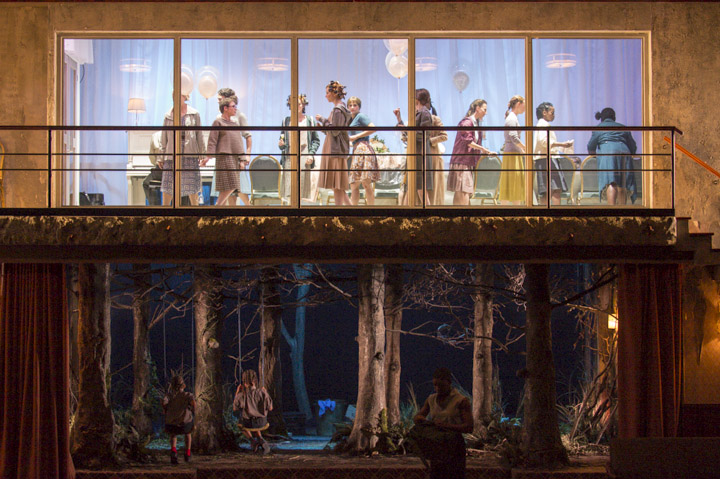
A view of Tom Scutt’s design for the production of ‘Medea’ © Richard Hubert Smith
JN. Some lines were spoken from the forest, as it were.
CC. It was called the forest?
JN. Yes, people coming through. But quite forward, not particularly back. It was only Medea at the beginning, at the back.
CC. And different members of the chorus, actually playing the bridesmaids at the wedding, spoke from different areas?
JN. Yes.
CC. Could we speak about the beginning, and the Nurse. The Nurse. I found the Nurse very interesting. Because Euripides has his prologue, the idea that somebody comes on and gives the exposition and the background...But she went beyond that in this production. In performance (and in Ben Powers’ text) the Nurse actually starts by saying ‘Listen!’ to the audience, and so she is emphasising the direct address. Did you work with the actor on that? It must have been hard.
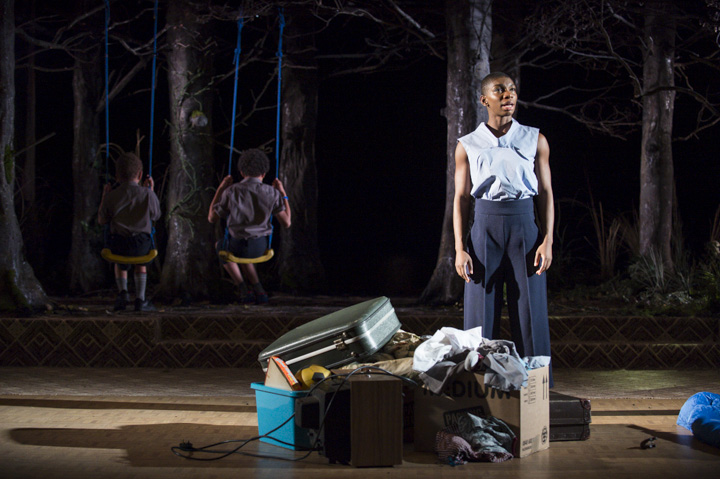
‘Listen. There’s a story that has to be told.’ The Nurse (Michaela Cole) © Richard Hubert Smith
JN. Yes, I worked with her very closely, actually, on both her big speeches, yes, I need to remember what I did. Yes, well, you’re working in a Greek amphitheatre. There is no fourth wall on the edge of the stage. The fourth wall is at the back. So, it was helpful to her to absolutely anchor the audience in with that. And, very much, we talked about storytelling techniques through that, that there is introduction, exploration, conclusion, not just one, over the whole speech, but continually, using those elements, trying to get into the ear of the listeners in that way. Beginnings of plays are always tricky anyway. You can’t go too fast, you know. Our ear has to adjust. And also Carrie was very, very keen that this was ultra natural, absolutely natural, for all of them, actually, all of the speaking. So nothing seemingly heightened or elaborated. And I enjoyed that too. That we actually used what is there in the structure that Ben has written for us, which is clearly rhetorical, but in as real a way as possible, because I do think we speak like that, actually, constantly. So that’s the work I did with Michaela, to help her to feel that although it was natural, storytelling, conversational, sharing, it had a very clear structure that helped to draw us in. And to book-end the play too.
CC. Yes, because she comes in again at the end, doesn’t she? (Not the chorus).
JN. And also that this story is recurring. That is her point, isn’t it? Inevitable.
CC. Yes. Lovely words at the end of the play: ‘Silence’ and ‘Darkness’. Beautiful. Jeannette, in your experience - and clearly, it’s a very wide experience - does a Greek text, a Greek tragedy, present particular vocal challenges for the actors?
JN. Well, the vocal challenges are the extremes of the emotions. So, they need to be in very, very good vocal shape. And Carrie was aware of that. We met before rehearsal began, of course, and planned out that we should do a lot of company voice work early on in the day, slowly, carefully, developing the work. For the chorus, a lot of it is sung as you know, but for the principal actors as well. You know some of those actors, those men, come in and just do one or two scenes. That’s harder than playing a whole role in a way so they need to be absolutely ready to go.
CC.The scenes with Kreon and Aegeus are particularly short. Helen McCrory seemed to win the sympathy of the audience in those scenes. She looked a pathetic figure, dressed in a shabby singlet and old chinos – seemingly clothes that had belonged to Jason and that she was now wearing, in a pitiful attempt to remain close to him. But ultimately, with winning the one day’s grace from exile, she is getting her way with Kreon, just as she will later with Aegeus, when she manipulates him into swearing that he wll give her future sanctuary in Athens. And, finally, she manipulates Jason into letting the children give the poisoned robe to his new bride. She mentally outclasses all the men in the end, doesn’t she?
JN . Oh yes. She’s an extremely intelligent woman.
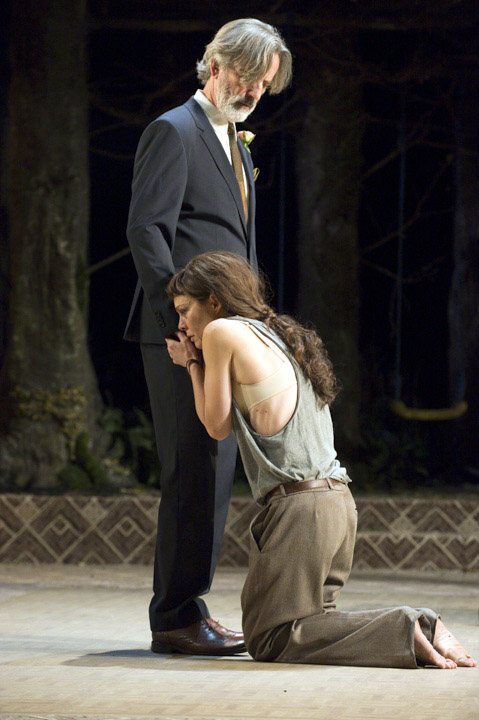
‘I am capable of some pity, Medea.’ Kreon (Martin Turner) and Medea (Helen McCrory) © Richard Hubert Smith
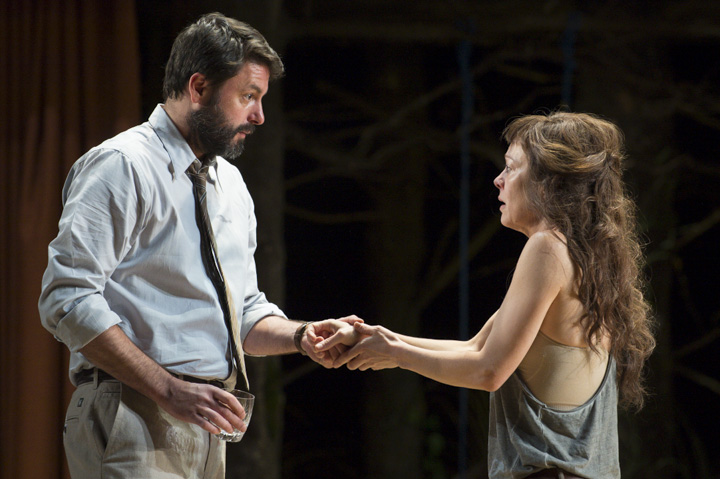
‘I swear by the earth, By the Sun God, And by the whole host of heaven.’ Aegeus, King of Athens (Dominic Rowan) and Medea (Helen McCrory)
© Richard Hubert Smith
CC. At one level, the play is really a series of scenes, duologues, with Medea, isn’t it? It’s thought that in the original performance in ancient Athens there were only two principal actors, one actor playing Medea and one actor playing everything else. So Kreon and Aegeus would have been played by the same actor, with different masks, of course, and possibly with differentiated voices. I never realised that these roles also make demands on actors today, but for different reasons.
JN. Yes, the demands for the male actors playing those roles are very particular. And all the actors have to be able to support their voices. And if you think about Helen as Medea - the range of vocal playing she has to do.... In a play like this, all the actors need access to that full range of the voice. And it must be very clear in terms of their articulation, and so forth. The Olivier is a big theatre.
CC. Talking about Helen McCrory’s voice.... I’ve seen her a lot on television, but I was hugely struck by the deep register of her voice. Did she work on that with you, to lower her voice for the role?
JN. No, she didn’t. No, she came with all of that. I’ve worked with her in the past. She has an extraordinary voice, and extraordinary range. Well, it reflects her range as an actress actually, doesn’t it? And it’s a very resilient voice, too. She’s very keen on voice work. I know she enjoyed the sessions very much and continues to do so. It’s at her instigation that our warm-ups, which would normally be about 20 minutes, were always half an hour at least. No, I didn’t teach Helen her voice! I helped her to keep it open and in shape.
CC. You mentioned the big space that the Olivier is. We know it’s based on Epidaurus, based on a vast amphitheatre, and it’s a very big space here, isn’t it? So, again, big demands for the actors?
JN. Yes. Really big demands. And especially for those who are not so experienced with big theatres. It’s to trust that the word lands in the space, to trust language in the space. And especially in an emotional play like this. With younger actors, it’s very often the case that they want to tell you a lot about how they feel, which gets very generalised. And my challenge is to help them (once they’ve found the emotional truth of it, which they have to) to trust that the words are telling us what they think. And I’m going to quote Cicely Berry (the former Voice Director at the Royal Shakespeare Theatre). When I worked with her, she once said something to me so pertinent, that she believes that audiences are more interested in what characters think than what they feel. And that is a very interesting observation. And taking that to an actor is to encourage them to trust that that is what’s happening. And that actually, if they do tell us what they think, they’ll be surprised what they feel. Obviously, they come from an emotional discovery first. But to be specific with what they’re telling us and each other. That means that sometimes it’s cathartic but it definitely moves the drama forward, it has to move it forward. If they just emote, then it becomes very generalised, we don’t hear what they’re saying, we don’t hear the whys and wherefores and where they want to go.
CC. If I could just refer now to the text, Ben Powers’ text? It seemed to me to be quite trimmed. There were various things - I think the choral odes were shortened and changed, the tutor in Euripides’ original text was omitted, and I think the Nurse took over quite a lot of what the tutor says. But it seemed to me to be immensely immediate. Is it very speakable?
JN. Yes. Ben Power is very talented. I’ve worked on his adaptations before. And he has a very good ear, I think, for the text, but also for the history, the development of text work, theatre text work as well. I’ve worked with him on Shakespeare and other classical pieces. If it wasn’t speakable, he was there to make it speakable. He was very keen. And they’d also workshopped it, I believe, at the National Theatre studio. Yes, he was very present and very keen to hear from the actors. There were occasions where things were tricky perhaps..... But I always tell actors actually that sometimes if a thing is difficult to say, it’s because it’s difficult to say, if you know what I mean. British actors are very good at smoothing things out, but actually the tussle of saying things is because there is a tussle to say something. So that’s always how I approach the work. I think Ben has great clarity of thought, yes, instinct and experience and research and education.
CC. Coming on just to (well not ‘just’) but to Medea herself and to Helen McCrory. The whole production has received wonderful reviews and she in particular. The Sunday Times, their review, spoke of her ‘ascending to greatness’. What a magnificent role to play, but also what a demanding and horrendous role. Inasmuch as Medea has committed atrocities in the pre-action, and during the action commits the worst kind of atrocity, really – infanticide, killing her own children in cold blood and in a premeditated way. Did you work with Helen McCrory, and do you know about how she could possibly begin to identify with this character? I know that she has two children herself with Damian Lewis. How do you get to that? How do you own the words and the actions of this woman?
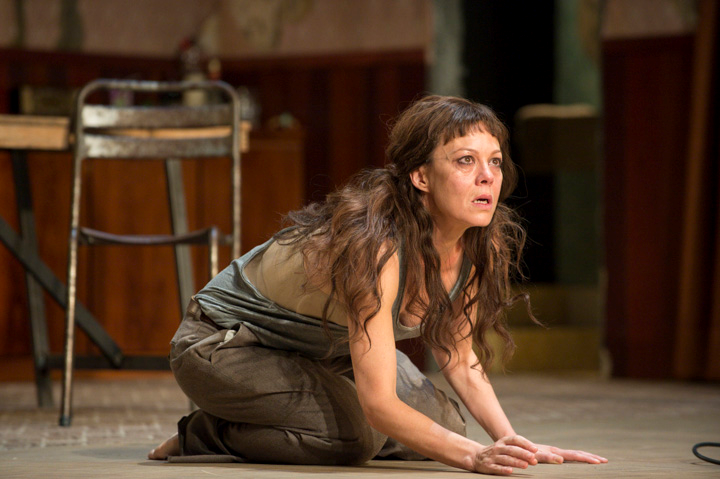
‘I have been wronged. Listen to me. And then say if my grief is excessive.’ Medea (Helen McCrory) ©Richard Hubert Smith
JN. Well, Helen has great access to her emotions, and she always has had. The first time I saw her was in The Seagull, playing Nina with extraordinary ease and access to her emotions. But she has great self discipline too. So, in rehearsals, she can very easily weep, she can move herself and tremble and be overwhelmed. But she is constantly saying ‘No. Discipline! Discipline! Don’t just cry! Discipline!’ You will hear her saying it to herself. ‘Discipline!’ Absolutely she wants to work with the thought, where the thought takes her and the structure of it. So she understands too – one of the reasons that she was very keen to do lots of vocal work and rhetoric with me is so that she is not overwhelmed, just overwhelmed by emotion, but that it is mentally, intellectually rigorous too. As I say, she has enormous self-discipline but enormous resources too and bravery doesn’t come into it! I was going to say she is uninhibited – I don’t know if that is quite the right word, because she has taste and that self-discipline – but she has an ability to be incredibly open, to be incredibly in the moment in terms of acting, and to be responsive in the moment to the people she is working with and to the direction the rehearsal is taking, and to her discoveries. So, she is just a very good technical and emotional and instinctive actress. She is the whole package.
CC. Could we talk about Medea’s first great monologue to the women in the chorus? It is seen now to be a great feminist speech. Did you do much work with Helen McCrory on this speech?
JN. I didn’t spend a lot of time working with her on individual speeches and I don’t recall what we did on that speech. But I did talk to her about classic rhetoric, to her and Danny, to all of them.
CC. Yes, there is a great argument, isn’t there, when Jason comes on, in the agon?

‘I hoped not to have to trade words with you like this.’ Jason (Danny Sapani) and the Attendant (Toby Wharton) © Richard Hubert Smith
JN. Yes. Absolutely. And persuasion, whether it is of somebody else or herself, is crucial to this play. I actually think every time you open your mouth onstage you are trying to persuade somebody of something. Perhaps in life too. But particularly in this sort of play. So, we absolutely talked about ethos, pathos and logos. Whether you are presenting yourself as being central to the argument, being authentic, having the knowledge to present your argument or the background, or about who you are. Whether you are working to affect the emotions of your listeners or whether you are trying to persuade them with evidence, and being logical. And especially with Medea and Jason, very clearly, at the beginning, you know, he is coming in with logic, logic, he is trying to hang on to that logic, logic, logic, and she’s going emotion, emotion, emotion. And, of course, the journey for Jason – at the end he is completely overwhelmed by emotion, it’s all emotion. And he has to go there. But in the first duologue, he also talks in terms of ethos as well. Some of his defence is about ‘I’m doing this for us, because I am...we are...our children....our family....’ It’s we, we, I, I, I. And sometimes they both mix them up a bit, you know, there’s logic and ethos going together and her with logic and emotion going together, which the actors found very interesting, that sense of those two things happening, and moment by moment trying to take a different tack. And that’s all relevant to that big speech at the beginning, relating to the chorus.
CC. I am so intrigued that you are using classical rhetoric today to help the actors access the text. Euripides himself would have approved! Medea has rightly been called the tragedy of discourse because it is a play that is so full of rhetoric and highly persuasive speech. Medea herself uses persuasion all the time, firstly to gain the sympathy of the chorus and keep them silent, and then with the men in the play. And she dissembles so much in the second duologue with Jason, even apologising to him for her violent recriminations in their earlier scene. And Helen McCrory makes Medea’s emotions appear even more complex in this production, as she shows that Medea still loves Jason in spite of it all, still has a devouring, all consuming passion for the man who has betrayed her.
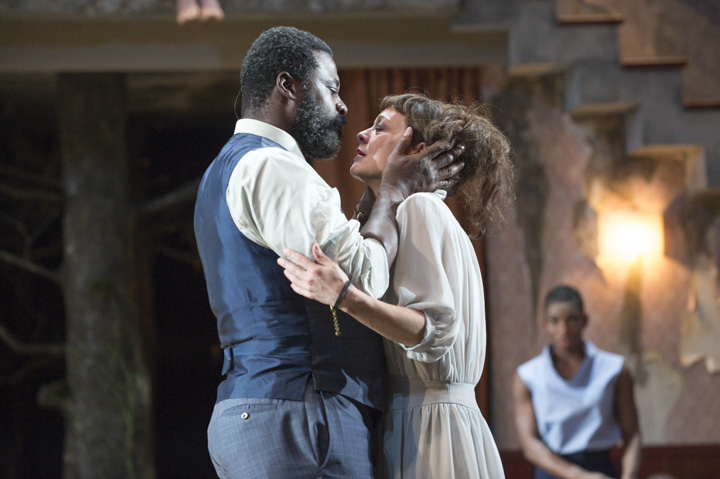
‘It was wrong of me to curse you. To allow my womanly jealousy To blind me to your wisdom.’
Jason (Danny Sapani) and Medea (Helen McCrory) © Richard Hubert Smith
JN. Yes, her passion for him throughout is made very evident.
CC. Whereas, as you say, Jason is logical. And the ancient Greeks favoured reason over passion, so the sympathy of the audience in the original performance would probably have been with the self-controlled man of reason rather than with the passionate barbarian outsider, the woman from the margins of civilised society (Jason actually says to Medea that he civilised her!). But it is different today. For Danny Sapani, playing Jason, wasn’t it difficult to own the words, when Jason, to our modern thought, seems to be acting entirely in his own self-interest in taking a new wife? Doesn’t he seems contemptible and patronising and his defence entirely specious?
JN. Well, the actor can’t feel that about himself. He has to find truth and belief in the role. And that is what I would look for in the text to support him in that, to back that up, and to back up the relationships and the strength of the relationships. It’s a tricky role and that is probably what intrigued Danny about playing it.
CC. Did you work with the children in the company?
JN. No, I didn’t.
CC. In the original text, the boys are silent apart from their offstage cries when Medea is killing them.
JN. They were allowed to say ‘Daddy!’ in this production.
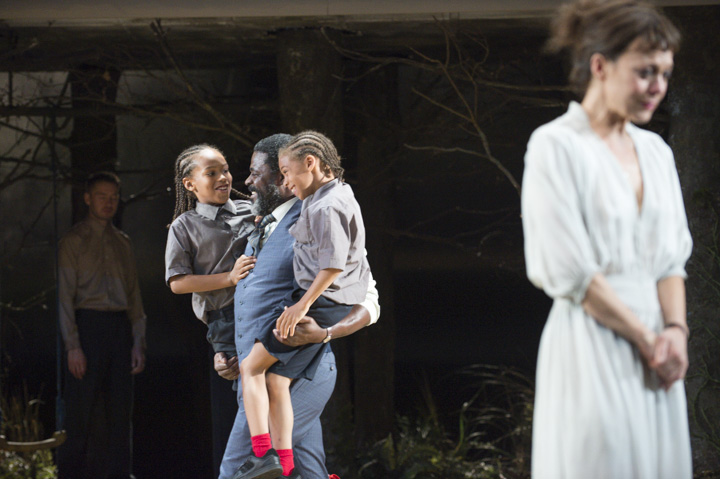
‘Daddy!’ Jason (Danny Sapani) and the children. © Richard Hubert Smith
CC. And that was very moving. You actually saw mutual love between Jason and his children. The production also featured Kreusa, Kreon’s daughter, as a silent character. The choreography by Lucy Guerin had Kreusa writhing in agony on the balcony as the poisoned cloak began to take effect. And, I was struck by Jason and Kreusa’s earlier ‘wedding dance’. In her scene with Aegeus, Medea has said that Jason is grossly in love with Kreon’s daughter. The dance showed the reality of this.
JN. Yes.
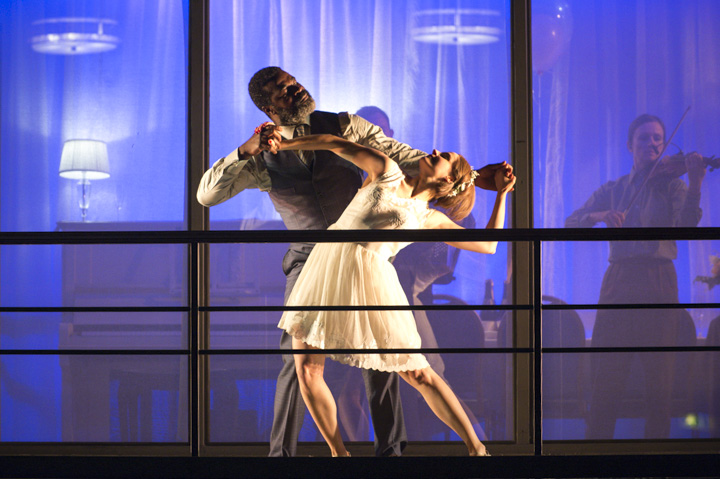
'He is in love, Grossly in love With a little girl, Kreon’s daughter.’ Jason (Danny Sapani) and Kreusa (Clemmie Sveass) © Richard Hubert Smith
CC. So, the chorus. Very much, the choral odes were sung in this production, with the music of Goldfrapp and the musical score that was written for the whole play, and for them. But there were quite a lot of individual lines. Did you work with the chorus on those individual lines?
JN. I worked with the chorus a lot. Alison Goldfrapp and her partner Will Gregory invited me to nearly all of the sessions. Because Alison really wanted a very specific technique, which is really how she sings too. And, of course, Alison is brilliant, but her voice doesn’t work as a trained voice, it works in a very natural way. So she was very keen that there was no sense of heighted vocal singing technique. Actually, the chorus all have principal talents, as it were, or skills, four of them are dancers, four of them are singers, four of them are actors. But they all did everything too. So, some of the singers had come from a musical theatre background, so she was very keen that they didn’t have any of that sort of twangy sound of the West End stage. So the work that I did with them in their voice sessions was very much towards that point as well, towards a very open, very natural sound. She didn’t want them to over articulate, to make it sound that they are all singing together, hitting the final consonant together, she wanted it much more natural. She also wanted them to hold notes for a very long time, which they did, so we worked a lot on capacity, but how you think to that as well, so it’s not just a matter of holding your lungs, making your lungs and ribs work properly, but the thought that goes through that that makes it go the end of the line and the end of the breath. And making quiet sound that is still open and clear, clear and true. We talked a bit about how choristers sing. And also, of course, producing quiet voices are much more hard work really than loud voices, in many ways. So we did a lot of work on that. The chorus had the biggest journey in terms of Carrie’s work, because they are so central to the play, and when she saw them and heard them in rehearsal she kept moving it forward and changing things. And there was one point where one of their speeches which was eventually divided up, they had been all speaking together. And I had done two or three sessions with them on how we do that, how we maintain the truth for everybody, but speaking together, which they enjoyed very much. And it stayed actually, it influenced all the work. And out of that, the individual lines could come more easily, there was a sense of talking to each other as well as with each other, having a conversation with each other and with us, whether they were speaking together or individually or two or three together.
CC. The movement was extraordinary. Very juddering, quivering movement, and very ethereal music, lovely to listen to. Was it difficult for the chorus to speak, move, sing at the same time?
JN. Oh no. These days, they can all do everything! It all comes from the same body and actually, the right movement will release a particular sound or thought and the breathing for voice frees the breathing for movement. So they do that very well. And I encouraged them very much to enjoy the texture of that, the spoken word and the sung word and the movement happening all at the same time and to really enjoy the juxtapositions and the weaving fabric of that.
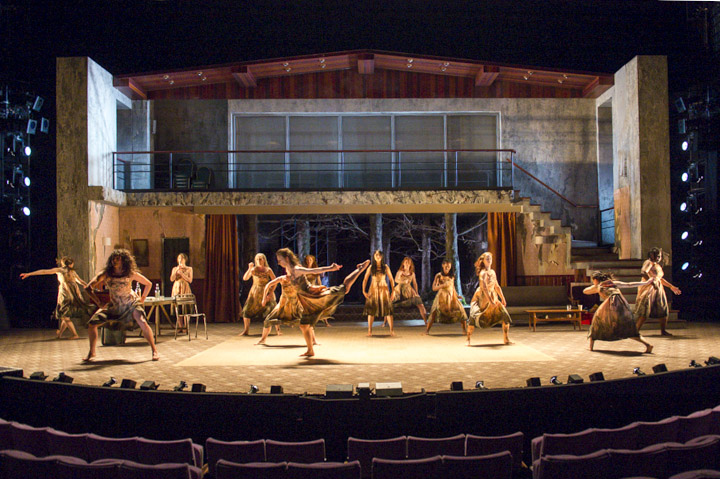
‘O gods Let your fury fall. Let the skies blacken Like burning flesh.’ The Chorus. © Richard Hubert Smith
CC. The music at times was unsettling and pulsating, adding to the tension as the play approaches its terrible climax. The choral ode that is sung while the princess is putting on the poisoned robe, ending in the invocation to the gods, was also extremely unsettling, the convulsive, ritualistic movement emphasising the horror of what was happening to Kreusa, and, indeed, to Kreon. Jeannette, could I ask you a difficult question now. If we could translate you, or transfer you from being Head of Voice here at the National, and take you back in time to the fifth century BC, to the original theatre where this play would have been staged, and have you working with the chorus of about fifteen young men, all amateurs.... Where would you start with them in terms of a very difficult text, and music to the aulos or the pipe or whatever? Would it be projection, clarity, the kind of areas you were talking about before?
JN. Yes, I don’t think voice ever changes really. They would probably have been working in the mask, or the half mask, and they may well, don’t they believe now that there may well have been some lead or something under the cheekbone area that would have helped in the conduction of sound? But, of course, the mask, you have to play the mask to the audience. (We understand that here. I often talk to the actors playing in the Olivier, saying that, in a way, you need to play the mask. which means that in order to know what you are saying, we have to see your face. We do read your lips. Of course, we don’t take that to the extreme here. But there is the sense that even if you’re not speaking we can read your thoughts from your face, take your thoughts out from the space). I would certainly start from the same point of breath support and resonance and articulation. But also the feeling that you played the space. There would presumably have been different acting demands anyway.
CC. Yes, a different style. We don’t know absolutely what that style was, we never will. But it is sometimes so interesting to ask people like yourself, working in the theatre now, about these things. And, as you say, it doesn’t change really, does it, the voice itself does not change. Acting styles might change but the needs of an audience to hear and to appreciate remain the same.
JN. They are always the same. And the actors always need to support the voice with the breath and the brain, support the word, every word. I have worked at Epidauros, that was on Peter Hall’s Oedipus plays, and we worked with full head masks then. But they actually had radio mikes built in. But that didn’t make any difference, they still had to be clear. They were quite difficult, those masks.
CC. Jeannette, talking of Epidauros, there is an acoustic hot spot in the orchestra there, isn’t there, a place where an actor can position himself or herself and can absolutely command the stage and auditorium? I’m wondering if the same thing applies in the Olivier Theatre, which is, after all, modelled on Epidauros?
JN. Yes, there is an acoustic hot spot or ‘sweet spot’ on the Olivier stage as well. In fact, we actually call it the Michael Bryant spot. Michael, that wonderful actor, did so much work here, was in so many different plays in this theatre. He always knew how to find that special acoustic place. So, we call it the Michael Bryant spot.
CC. I know that you are always working on different plays yourself, and that it must be hard to recall one particular play in great detail. But could I ask you if there was a particular speech in Medea that you loved working on, something that you really remember?
JN. Something that I loved.......Well, I think the Nurse’s speeches were both really interesting. And I’m always interested in the Messenger speeches, the Attendant, in this production. He has to come on....and it’s often the hardest thing to do, to come on and deliver that. And Carrie was very clear here that she didn’t want him to present his emotion overwhelmingly. So we spent quite a lot of time trying to help him to distance himself from it but there’s a sense that it should be cathartic for him, there’s the need to speak it. I hope you don’t mind me saying this here, but I talked to him about my incredibly clear memory of coming home and my husband saying ‘Come and see the television’ when the twin towers came down, and the thing I remember most about that evening was when the journalists were there, people were rushing up to them to bear witness. The need for people to speak what they had seen was incredible. They were emotional of course, but they all spoke what they saw, they found the words. And I think this is a very powerful lesson, especially for young actors. It goes back to what I was saying at the very beginning about emotion. So this was particularly relevant to this Messenger speech, the Attendant speech in our production. It helped him to find the journey through that. The need to make it clear.
CC. I wonder if I could talk to you about the great speech near the end of the play when Medea has killed Kreusa through the poisoned dress and is actually preparing herself to carry out the murder of her own children, deliberating really whether to kill them or not. It is a speech of great indecision and great interior anguish. It shows Medea’s divided self, the loving mother versus the implacable avenger. She is constantly changing her mind in the speech, saying ‘Yes, I will’, ‘No, I won’t’. She eventually realises, of course, that the children are going to be murdered by the Corinthians anyway, in revenge for the death of the princess and Kreon. In your opinion, was there a particular point when she finally came to the resolve to commit the murder?
JN. Yes, there was. She has to steel herself to murder her children. And this speech reminded me so much of Helen saying to herself in rehearsal ‘Discipline! Discipline!’ Medea is constantly going from one thought to another. She reviles herself for her woman’s weakness. She says that she must fight it, must fight that woman’s weakness. But, in looking at her sons, she is reminded of her brother and what she has done to him, and she feels great anguish. She knows she must hold herself together but she is revolted. She says ‘My heart! Do not do this thing’. But throughout the speech, we picked up moments where she talks about the past and the future, and then, ultimately, she comes to ‘Now’, she begins to say ‘Now’ several times. And at the very end we absolutely took this to ethos, pathos and logos. She says
At last.
I understand
What has been
And what I must do.
‘At last’ which is emotion and pathos; ‘I understand’ which is reason, logos; ‘what has been’ which is talking about the past, and ‘see what I must do’ which is her ethos. It just all comes together in that moment.
CC. And she says ‘now’ a lot (you’re absolutely right, of course) in the very final words that she speaks when she has committed the murder and is shouldering those poor little bodies in the sleeping bags. Mary Beard, the classicist Mary Beard, wrote a review of the production in the Times Literary Supplement and admired a great deal, especially Helen McCrory’s central performance. However, there is one point she makes about the ending of the production, where Medea and Jason confront each other on the same level. It is thought that Euripides, in the original staging, would have had Medea appearing in the dragon chariot on the crane in a triumphant apotheosis. Mary Beard felt that this relationship to the original text should have been retained, as the more theatrical ending demonstrates that Medea is the granddaughter of the sun, and is nearing divine status.
JN. Well that decision would have been made long before I got close to the actors. But the ending in Carrie’s production was extremely moving. And, of course, you felt that Medea had a superhuman power to carry the boys on her shoulders, calling on the gods. You felt she was in the company of her ancestors.
CC. Aristotle would have approved of the changed ending probably. He found Medea’s appearance on the mechane in the original staging very clumsy and contrived!
JN. Well, there you are then!
CC. Could I ask you one final question about the play? Euripides was quite a controversial figure and when this play, in its group of four, was first staged in 431 BC it didn’t win, it won only third prize. It’s thought it might have been too daring for the audience and the male judges. Euripides wrote a great deal about women and female grief, particularly grief arising from the loss of children, in such plays as Hecuba and The Trojan Women and Iphigenia at Aulis. But in this play, Euripides actually decides that Medea is going to kill her children – he adapted the myth so that Medea plans the murder and carries out the murder in cold blood to avenge herself on Jason even though she fully foresees the self defeating horror of her revenge. In your opinion, having worked on the play, what was Euripides trying to do? Was he making a political point, was it a social issue, what do you think his purpose was?
JN. I have no idea! Largely, maybe, it’s a social issue, about relationships. In the end, that’s what most plays are about, relationships of some sort, whether it’s married relationships, father and daughter, father and son, parent and child, it’s the relationships that interest us, isn’t it? Seeing other peoples’ stories told, it makes us look at our own. I don’t know if Carrie talked about this in the Platform (National Theatre Platform, Tuesday 12 August: Carrie Cracknell and Tom Scutt on’ Medea’) but the company had a psychologist come to talk to them, which they found so interesting.
CC. Yes, because to contemporary thought, Medea is believed to be an abused figure, isn’t she?
JN. Well, that is what is believed in psychology today, isn’t it, that actions such as hers come from something else.
CC. This has all been fascinating. Jeannette, thank you very much for your wonderful insights into this production of Medea and into your role as Head of Voice at the National Theatre.
JN. It’s been my pleasure, Chrissy. Thank you.
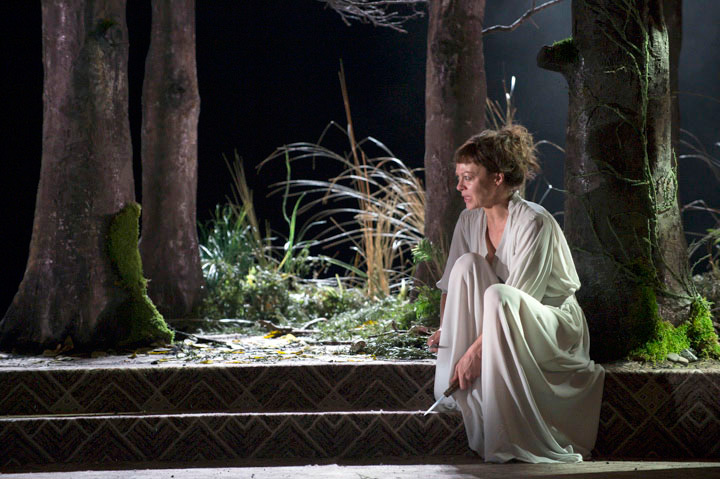
‘Now.’ Medea (Helen McCrory) © Richard Hubert Smith